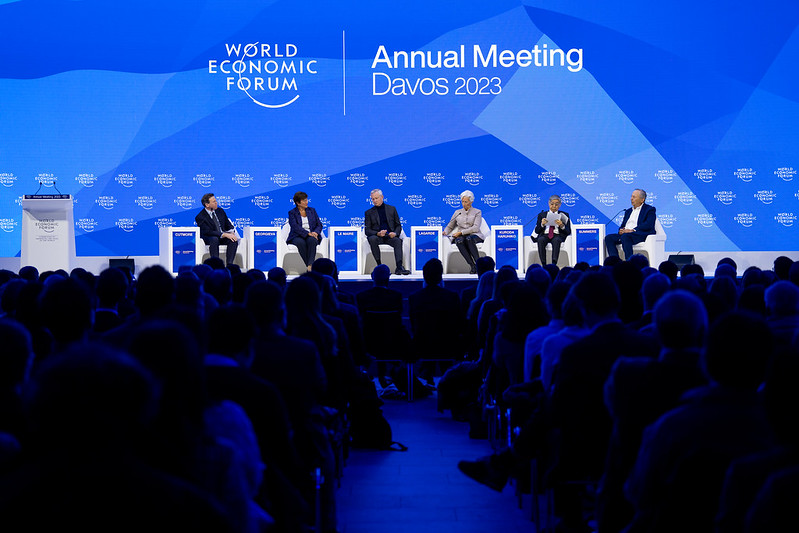January 2023’s World Economic Forum (WEF) meeting in Davos brought an in-person return to the annual event which engages leaders across business, political, and cultural sectors, with a mission to improve the state of the world.
Sandra Navidi, Founder and CEO of BeyondGlobal, and bestselling author of three books, including “$uperhubs: How the Financial Elite and their Networks Rule Our World,” “Future IQ: Your Success Strategies in the Age of Artificial Intelligence,” and “Die DNA der USA: Wie tickt America,” attended for the 14th time, and shared with Vivaldi her takeaways from this year’s forum.
—
How did returning in-person this year, post-pandemic, feel different from previous years?
Generally, the atmosphere was surprisingly cheerful. Participants were genuinely happy to see each other again and meet new and interesting people. More specifically, the mood depended on the respective industry. Leaders of the business and finance community tended to be cautiously optimistic. The pandemic seems to be under control, the economic fallout from the Ukraine war has been moderating and geopolitical risks have — at least for the time being —not significantly escalated. However, attendees from other segments such as Ukrainian politicians, climate scientists or activists in the humanitarian sector, were more concerned and tense.
This year’s theme was “Cooperation in a Fragmented World.” How did the conversations speak to or explore that theme?
“Cooperation in a fragmented world” could have been the motto in any of the previous years. However, over the past few months the degree and severity of fragmentation has exacerbated. Thus, it was even more crucial than ever for a diverse group of business leaders, politicians, experts and civil society representatives with different viewpoints, experiences, and insights to congregate. Every current pressing issue was addressed, often from a fresh perspective and different angle. The WEF’s particular value add is that attendees get out of their professional bubbles and analysis paralysis. They engage in discussions across silos with people and on topics outside of their immediate area of expertise or specific business. This intersectional approach stimulates cross-fertilization which is indispensable as most global issues such as climate change, economic inequality and political instability call for cohesive, comprehensive and holistic systemic changes. By working together, individuals, organizations and politicians can pool their knowledge and resources to find solutions to those complex problems. For example, I observed various discussions on the topic of how to best address the climate crisis by way of innovation, which involved scientists, oil and other industry executives, titans of finance, activists and politicians.

Sandra Navidi at WEF 2023 | Photo courtesy Sandra Navidi
It seems like there are mixed messages currently coming from the tech sector — we’ve seen recent company layoffs, but there are also a lot of new developments (AI, ChatGPT). What were the sentiments or conversations specifically around the tech sector?
The WEF and specifically its founder, Klaus Schwab, have focused on digitization and the economic and societal implications for a long time. Over the last few years, the program has featured the most fascinating topics and inspiring speakers. In view of the generative AI hype, crypto currency failures and the promise of blockchain, tech was one of the top topics. ChatGPT and the downfall of FTX were amongst the topics most discussed in the hallways of Davos. A number of insightful sessions featured artificial intelligence, for example to fight wildfires or to support mental health. Many of the Silicon Valley titans were in attendance, like the CEO Microsoft, Sundar Pichai, the CEO of Salesforce, Marc Benioff and the CEO of Palantir, Alex Karp. Elon Musk, who had falsely claimed that he had been invited but passed, wasn’t really a subject of the discussions.

Copyright: World Economic Forum / Boris Baldinger
What were the conversations around young people/Gen Z in the workforce?
The Forum makes an effort to invite representatives of all stakeholder groups, including young people. This younger generation has grown up in a time of rapid change and uncertainty and the WEF addresses many of their greatest concerns, such as the climate crisis and environmental degradation, the future of work, economic inequality, social division, and mental health. To incorporate young people’s input and ideas into initiatives and proposed solutions, the Forum has cultivated a group of future decision-makers, the so-called “Young Global Leaders” and “The Global Shapers” Community, which consists of inspiring people under 30 who have dedicated themselves to proactively addressing global challenges. For instance, the WEF has included an impressive lineup of young tech pioneers in the energy, financial and medical sectors.
There have been concerns around tensions with China, and there was a session on “China’s Next Chapter” (resuming travel, economic outlook, tech sector impact) — what did the sentiments seem to be around that?
Due to the Covid pandemic, there were fewer participants from mainland China this year. The Chinese are usually enthusiastic participants, who are welcomed with open arms as other attendees are eager to do business in or otherwise engage with China. Vice Premier Liu He in his speech struck a particularly cooperative tone. The political class in China is under pressure to generate growth and they sense competitive pressures from India as many businesses consider diversifying risk by moving at least parts of their businesses from China to India. Accordingly, the largest contingent of participants were representatives from India, who appeared particularly optimistic.
Did you have one big takeaway, or a key conversation that really stood out?
I was left with the strong sense that following the Covid pandemic, there’s an entirely new level of appreciation of in-person meetings. This year’s WEF hosted a record number of business and government leaders, including more than 600 CEOs, with a record-low level of cancellations.
People were eager to see each other in-person and communicate face-to-face, feeling a shared sense of purpose. As I can attest, engaging in shared experiences, working towards common goals, gaining a better understanding of each other’s differences, and learning from each other, creates human ties that are impossible to build virtually.
—
Sandra Navidi is the Founder and CEO of BeyondGlobal, where she provides macroeconomic and strategic positioning advice. Previously, she worked closely with economist Nouriel Roubini at Roubini Global Economics. She is admitted to practice law in the Federal Republic of Germany and the State of New York, and is the author of “$uperHubs: How the Financial Elite and their Networks Rule Our World” and “Future IQ: Your Success Strategies in the Age of Artificial Intelligence.”
